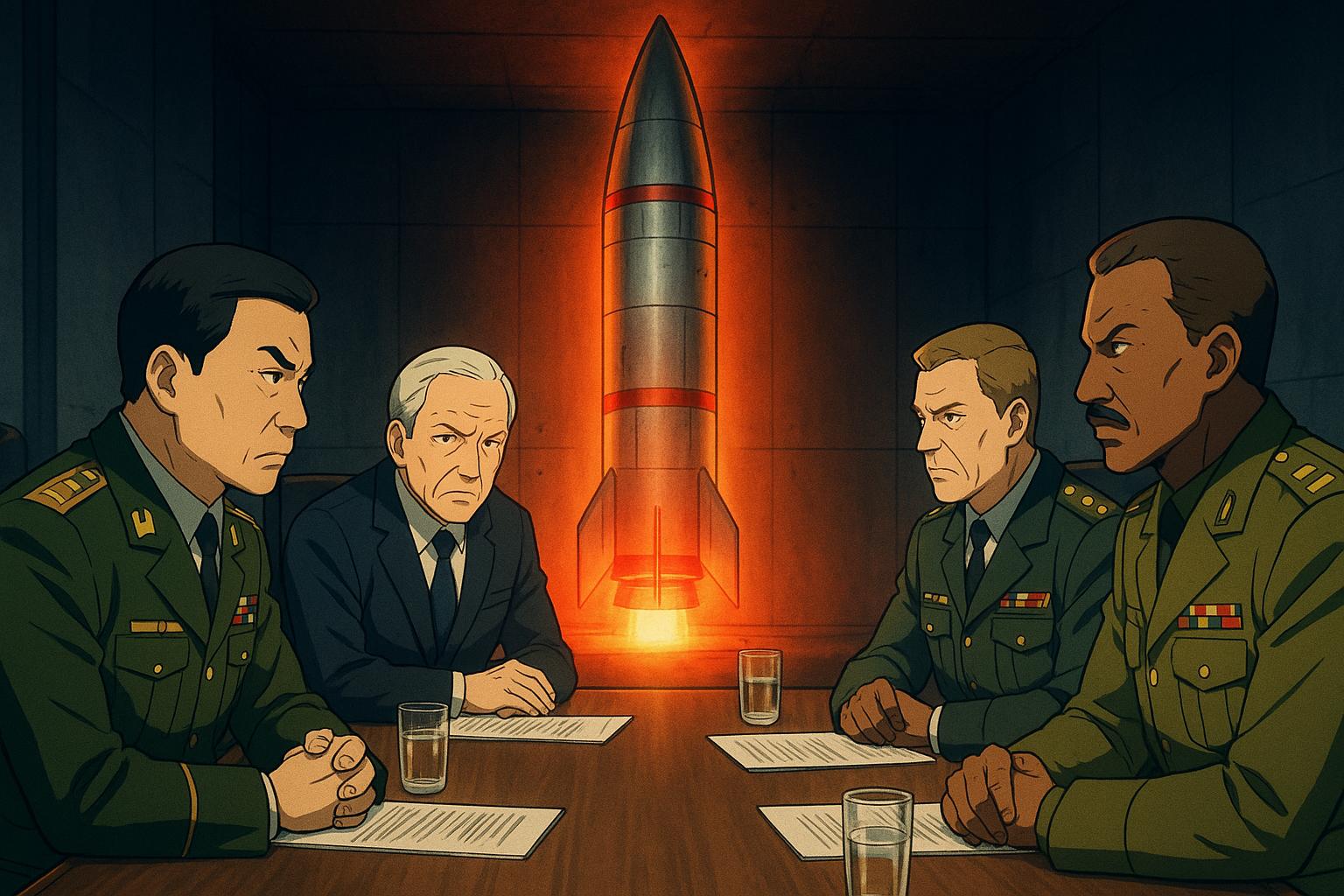Former UK Defence Select Committee chair Tobias Ellwood has cautioned that Vladimir Putin could deploy tactical nuclear weapons within five years, potentially outside Ukraine, as Russia tests Western resolve. The escalation underscores urgent calls for stronger UK military deterrents, highlighting shifting nuclear dynamics amid intensified Ukraine conflict and rising Russian threats near NATO borders.
The ongoing war in Ukraine has fundamentally reshaped global security discussions, particularly around the threat of nuclear weapons. Former chair of the UK Defence Select Committee, Tobias Ellwood, has expressed alarming concerns regarding the potential use of tactical nuclear weapons by Vladimir Putin within the next five years. He emphasised that such a strike might not even occur in Ukraine, suggesting that it could target a different location as Russia tests Western responses to its military aggressions. “In the next five years, I could see a tactical nuclear weapon, a low-yield nuclear weapon, being used,” Ellwood warned. He urged expedited efforts to bolster the UK's military capabilities, particularly highlighting the necessity of acquiring more F-35A fighter jets for deterrent purposes.
Ellwood’s insights correlate with a broader narrative about the precarious nature of nuclear diplomacy in the context of the Ukraine conflict. Although tactical nuclear weapons are traditionally designed for battlefield use with yields as low as 1 kiloton, their deployment holds deep implications for international security. These weapons are not only compact and transportable, but they also fall outside the purview of arms control agreements, allowing countries like Russia to maintain a strategic ambiguity around their numbers and readiness.
Reports of Ukraine’s recent drone attacks on Russian military assets have underscored vulnerabilities in Moscow’s strategic framework. This sophisticated operation reportedly damaged a substantial portion of Russia's long-range bomber fleet, signalling Ukraine's increasing military capabilities and strategic reach. Analysts suggest that while the losses do not dismantle Russia's nuclear capabilities, they compel the Kremlin to reconsider its military strategies. The Ukrainian success in striking deep into Russian territory sends a clear message: the sustainability of a prolonged conflict is under pressure, especially as Western nations deliberate their military support for Ukraine.
Simultaneously, loud alarm bells have been sounded from Russia regarding its nuclear arsenal. President Putin has indicated that Russian nuclear forces are on ‘constant alert’ and assert that they have made advances in nuclear technology surpassing those of the United States. While he has voiced a readiness to employ nuclear weapons in the context of defending national sovereignty, observers note that he has yet to find a necessity to do so. The West, led by the US, UK, and France, continues to issue warnings, yet they have ruled out direct military intervention, keenly aware of the catastrophic implications of any nuclear engagement.
Strategically, Russia has bolstered its nuclear posture by relocating tactical nuclear weapons to Belarus, an ally positioned near NATO members. This development enhances Russia’s capacity to target Eastern and Central Europe while also laying bare the complexities of regional security in light of NATO's collective defence commitments. The interplay between military readiness and diplomatic engagement remains tenuous, as countries navigate the charged atmosphere of nuclear threats without crossing lines that could lead to escalation.
The hurdles in balancing military preparedness and diplomatic negotiation reflect a broader systematic issue, as nations grapple with threats that have once again come to define 21st-century global politics. As both sides prepare for potential confrontations, the quest for stability amidst chaos continues to command attention on the world stage.
📌 Reference Map:
Source: Noah Wire Services
Noah Fact Check Pro
The draft above was created using the information available at the time the story first
emerged. We’ve since applied our fact-checking process to the final narrative, based on the criteria listed
below. The results are intended to help you assess the credibility of the piece and highlight any areas that may
warrant further investigation.
Freshness check
Score:
7
Notes:
The narrative presents recent concerns about Russia's potential use of tactical nuclear weapons, with references to statements by Tobias Ellwood and other developments. However, similar discussions have been reported in the past, such as Ellwood's warnings in 2022 and 2024. ([parallelparliament.co.uk](https://www.parallelparliament.co.uk/mp/tobias-ellwood/debate/2022-10-11/commons/commons-chamber/ukraine?utm_source=openai), [gbnews.com](https://www.gbnews.com/opinion/our-nuclear-deterrence-works-and-russia-knows-it-says-tobias-ellwood?utm_source=openai)) The inclusion of updated data may justify a higher freshness score, but the recycling of older material warrants a flag. ([express.co.uk](https://www.express.co.uk/news/politics/1888733/Nuclear-war-fears-five-years?utm_source=openai))
Quotes check
Score:
6
Notes:
The narrative includes direct quotes from Tobias Ellwood regarding the potential use of tactical nuclear weapons by Russia. Similar statements have been made by Ellwood in previous years, indicating potential reuse of content. ([parallelparliament.co.uk](https://www.parallelparliament.co.uk/mp/tobias-ellwood/debate/2022-10-11/commons/commons-chamber/ukraine?utm_source=openai), [gbnews.com](https://www.gbnews.com/opinion/our-nuclear-deterrence-works-and-russia-knows-it-says-tobias-ellwood?utm_source=openai)) Variations in wording across different reports suggest some differences in phrasing. The absence of online matches for certain quotes may indicate original or exclusive content.
Source reliability
Score:
8
Notes:
The narrative originates from Express.co.uk, a UK-based news outlet. While Express.co.uk is generally considered reputable, it has faced criticism for sensationalism in the past. The inclusion of references to other reputable sources, such as Reuters and AP News, strengthens the overall reliability. ([reuters.com](https://www.reuters.com/world/europe/putin-says-russia-reserves-right-use-nuclear-weapons-if-attacked-2024-09-25/?utm_source=openai), [apnews.com](https://apnews.com/article/91f20e0c9b0f9e5eaa3ed97c35789898?utm_source=openai))
Plausibility check
Score:
7
Notes:
The claims about Russia's potential use of tactical nuclear weapons are plausible, given the current geopolitical tensions. Statements by President Putin and other officials have indicated a lowered threshold for nuclear use. ([reuters.com](https://www.reuters.com/world/europe/putin-says-russia-reserves-right-use-nuclear-weapons-if-attacked-2024-09-25/?utm_source=openai), [apnews.com](https://apnews.com/article/91f20e0c9b0f9e5eaa3ed97c35789898?utm_source=openai)) The narrative's tone and language are consistent with typical reporting on such sensitive topics.
Overall assessment
Verdict (FAIL, OPEN, PASS): OPEN
Confidence (LOW, MEDIUM, HIGH): MEDIUM
Summary:
The narrative presents concerns about Russia's potential use of tactical nuclear weapons, incorporating recent statements and developments. However, the recycling of older material and the presence of similar discussions in previous reports suggest a need for caution. The inclusion of reputable sources and the plausibility of the claims support the narrative's credibility, but the overall assessment remains open due to the identified issues.
